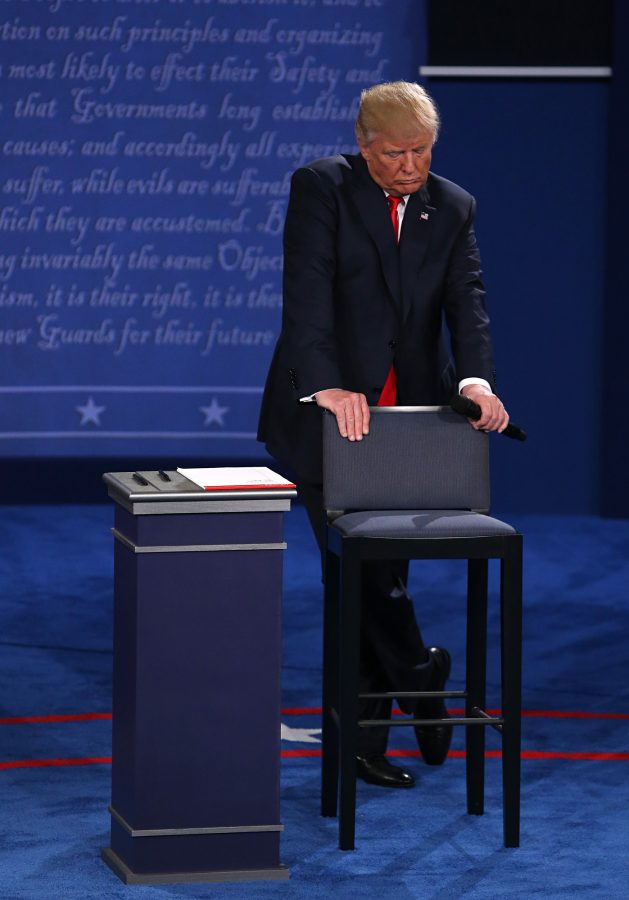Tweeting Trump: A case for “soft power”
Donald Trump listens during the second debate between the Republican and Democratic presidential candidates on Sunday, Oct. 9, 2016 at Washington University in St. Louis, Mo. (Christian Gooden/St. Louis Post-Dispatch/TNS)
October 19, 2016
 We’ve seen over this past year presidential candidates Hillary Clinton, Donald Trump and others make their best efforts to increase followers in the social media world, while also attempting to hold an appeal to their followers. Specifically looking at Twitter, my goal is to analyze the words that the candidates use to generate power.
We’ve seen over this past year presidential candidates Hillary Clinton, Donald Trump and others make their best efforts to increase followers in the social media world, while also attempting to hold an appeal to their followers. Specifically looking at Twitter, my goal is to analyze the words that the candidates use to generate power.
What makes a tweet so powerful? Start with exposure. There are over 300 million Twitter users every month, and it is important to garner a targeted audience who can see a given tweet. The overall objective of any “twitter noob” should be to gather this audience by increasing the rate of exposure through every added follower. However, becoming a powerful tweeter means absolutely nothing without valiancy. In short, the people who are following your feed need to see quality tweets, which provoke them to engage, and allow the update to be endorsed by likes, retweets and mentions.
Trump is society’s favorite candidate to see tweets from, as his follower base hits 12.6 million people compared to Clinton’s 9.8 million. So, no doubt the exposure is there for his tweets. When he updates his timeline, he receives more than 30k likes and about 13k retweets, both of which are astronomical numbers in the twitter world. This proves his tweets hit on topics the public feels strongly about. So by my theory, Donald Trump is powerful, especially through his persuasive tweets on Twitter. This gives him soft power, meaning that he has influence through Twitter to induce strategic reactions among readers.
One tweet he posted at around 8 a.m. on Sunday morning stated that the election was rigged by the media, going on to explain that the news put stories in place to give Hillary a boost in the polls.
This is a perfect example of Trump using his “soft power” in light of discrediting the media around him. His goal by these tweets was to show that news agencies, such as The New York Times, are unreliable in determining what candidate is a better choice. Agreeing with him, his followers on Twitter liked, favorited and reacted to his tweet.
Get The Daily Illini in your inbox!
He received 32k likes and 13k retweets, which is impressive as compared to other political candidates. The like rate indicates his valiancy, and it proves to be very high, but his retweets seem to show something even more interesting. Yes, we know his tweet had the potential of reaching 12.6 million people, but 13k of his followers also retweeted this for their followers to see.
Let’s say every account carried an average of 200 followers, providing 26k additional accounts to see Donald Trump’s tweet about the unreliable media. This gives his tweet more exposure, and as his like rate goes up, that exposure will lead to increased valiancy. This provides Trump with more credibility, resulting in increased power.
Now, as a reader it could be hard to understand why this soft power is important. In the case of Donald Trump, what does it actually mean for him to carry this attribute? It might mean nothing, as people can argue the importance of hard power and its case for being the only true form of power that matters. But, I challenge that statement.
I see soft power as a way for Donald Trump to actually win this election. Since he has a higher follower base, his tweets reach more people. More retweets could possibly increase his “like” rate, providing his page with increased valiancy.
This increases soft power, allowing his ideas to increase in credibility. And logically, when his credibility increases, his overall support base will increase.
Twitter is not a political joke, but rather a strategy to the political game board. The winner of the board is determined by various soft power strategies, and the pieces being played are students and young and middle-aged adults. Donald Trump and Hillary Clinton look to play that board in the next couple of weeks, making for a fascinating conclusion to the hard fought battle of this election season.
The strategy of soft power could get Donald Trump over the magic number of 270 electoral votes, making him our next President of the United States. Great or catastrophic? I’ll let you make that conclusion.
Brandon is a sophomore in LAS.







